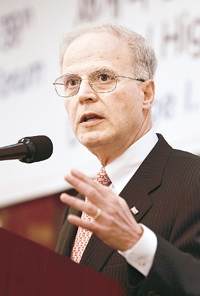
Universities need freedoms to go global

Harvard professor says research key to becoming global university
A Harvard University professor said universities should strengthen their research as one way to become a global entity.
Jorge I. Dominguez, vice provost for international affairs at Harvard University, spoke at a forum Wednesday under the theme, “Global Higher Education from the Eyes of Harvard University.” The Korea Foundation hosted the forum.
Dominguez said research universities are institutions that define their fundamental mission as the generation, application and dissemination of knowledge.
To become a research university, he said six freedoms are essential.
“For research universities to work there are certain necessary freedoms. Freedom from the church, freedom from the state, freedom from donors, freedom from arrogance, freedom from people like me (university vice provosts), and freedom from the past,” said Dominguez who was also the Antonio Madero professor for the study of Mexico.
He said there cannot be a decision by university authorities to determine in advance what the results of research will be.
“The dogma cannot precede or supersede research. There are many churches that own and operate universities and do a good job but those who govern the universities shouldn’t be imposing their dogma on research,” he said.
The second was freedom from the state. Dominguez said there should be no prior imposition of a dogma on the part of public authorities to get in the way of research.
As the most significant example of a political decision to block general research in science, he cited the Soviet Union when Stalin abolished the study of genetics.
“That is one reason why the Soviet Union was good at physics but not good at life sciences,” he said.
At Harvard in the 1950s, there was significant and persistent persecution of communists. “Freedom from the state means the freedom from that kind of political dogma. The second kind of freedom from the state is the freedom from labor market protectionism,” he said. “This means only hiring citizens of that country deprives a research university of the ability to appoint the best talent, independent of passport.”
Third, he stressed freedom from donors. The university, not the donor, has the right to admit specific students and when to allocate funds to those students.
“A university should actively look for sponsored research but it should not engage in research that the sponsor is supporting. It should be free to publish, discuss and analyze and be free from the decisions that interfere from sponsored research,” he said.
Fourth was freedom from arrogance. A university must not be arrogant enough to think its own faculty is the best.
“To promote faculty from within is a good thing, but just to promote it from within is not. They should also hire faculty from other parts of the world,” said Dominguez.
He also underlined the importance of peer review by other scholars before an article or book is published.
“The system of peer review is the heart of survival and development of universities. Universities must be free from believing its internal organization is optimal. It must systematically submit itself to review the assessment of each of its programs,” he said.
Research universities should also be free from school administrators.
“Academic freedom must be professor-centered. Only professors should choose the topics on which they will work in, they’re the ones who design the research and decide the arguments,” said Dominguez. “Independence from the universities’ own authorities is an essential feature of a research university. No one should be compelled to do research they don’t choose to do on their own.”
Finally, universities must be free from their past.
“A university must identify the mistakes that it has made and admit them and be smart enough to correct them,” he said. “Harvard has a shameful history. It wrongfully discriminated against African-Americans, Jews, and women in the past. But I am proud that all of these traits of Harvard history are being or have been overcome. It is important for people like me to acknowledge this in public.”
At the end of the speech, Dominguez made clear that the research university he talked about was just one aspect of ways to become a global school. There could be others such as hiring good faculty and recruiting talented students. But this didn’t mean they necessarily had to be “international.”
“I don’t like the term national or international. I’d rather say passport blind. This means regardless of one’s nationality, the staff and students must be chosen based on their abilities. In the end, it’s about choosing talented individuals,” he said. <Korea Times/Yun Suh-young>


